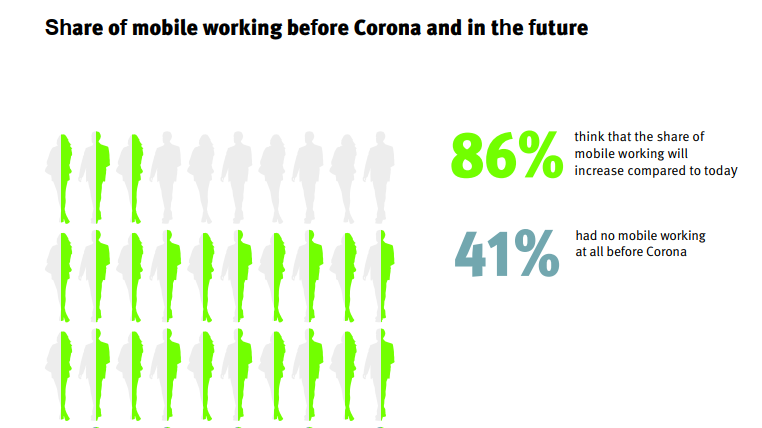Stuttgart, Germany, August 3, 2020. The Covid-19 shutdown changed the office environment overnight. Those who could did swap the office for their own four walls at home. This trend towards working from home triggered a debate as to whether office space still has a future. The number of square meters is not the crucial factor in this regard; instead, it is primarily the quality of the space that determines its future viability. The office of the future is individual, flexible and location-independent. These are the key results of a recent internal survey conducted by the Drees & Sommer Group with headquarters in Stuttgart, Germany.
The survey was conducted in July 2020. Around 1,500 of the approximately 4,000 employees took part, equally divided between men and women. Of these, around 90 percent are in permanent employment with standard working time of 31-40 hours per week. More than two thirds of the participants work in the operational business. Around three quarters of the respondents are between 28 and 47 years old.
Mobile Working on the Advance
The corona lockdown has resulted in an unprecedented field study of office workplaces. Pre-corona, not even half of the participants had worked mobile. Now, the vast majority (83 percent) can imagine working one to three days a week on the move or from home. ‘Before the pandemic, a trend was already apparent. It emerged even more clearly during the crisis,’ explained Martin Becker, Partner at Drees & Sommer SE. As Managing Director of RBSGROUP – Part of Drees & Sommer, he is familiar with the design of sustainable working environments: ‘The one single workplace no longer exists. In order to remain attractive to both new talent and their existing workforce, companies must become more flexible in their choice of work location. Going forward, people will not only work in the office, but also at their home desk or in a mobile office, such as a café or co-working space.'
Flexible Areas for Specific Tasks
This method of working from anywhere also brings challenges. The boundaries between work, family and leisure are becoming increasingly blurred. Just taking a few moments to reply to an email while the children are watching Sesame Street, or quickly revising the presentation at the weekend? When a person's work is done in the private sphere, one's own four walls lose their function as a place of retreat. Not everyone is comfortable with that. That's why the office will continue to play an important role in the future – if it is tailored to the needs of the users.
Increasingly complex task structures require an individual and needs-oriented design of the workplace. Anyone who holds video conferences or wants to work creatively needs a different environment than someone who is just focusing on writing. Three quarters of the survey participants see a need to catch up, especially in the case of space for focused work. More than half also would like more space for communication and dialog. ‘The office of the future must offer everything that remote working from home cannot provide, or cannot always provide: concentration, communication and cooperation. Shared spaces in particular offer the opportunity for chance encounters. This not only affects the psychological well-being of employees. Shared spaces also create trust and a sense of community, i.e. the pre-condition for creative problem solving,’ commented Martin Becker.
Re-thinking the Workplace
Those who design their office in line with these aspects create a place with an excellent working atmosphere and a high quality of user experience. It is precisely this environment that is crucial to ensuring that the office will continue to act as a center of attraction. ‘The office will change from a simple place of work where you have to stay, into a location offering personal contact, human togetherness and a network meeting point for dialog between colleagues, and with business partners and clients. So it is essential to completely re-think the workplace, looking at the overall picture of office, home, and mobile working in hotels or co-working spaces,’ the Drees & Sommer Partner and RBSGROUP Managing Director continued.
Nevertheless, there is no universal solution that is equally appropriate for everyone. Instead, the expert on the working environment recommends focusing on the needs of the employees and the company. ‘As a general rule, investment in an optimal working environment not only strengthens employees' loyalty to the office, but also to the company. And it will pay off, both in monetary terms and through the appreciation felt by employees,’ said Martin Becker.
You can find out more about the demands of the new working environment in the Drees & Sommer thematic dossier Workplace Reloaded.
